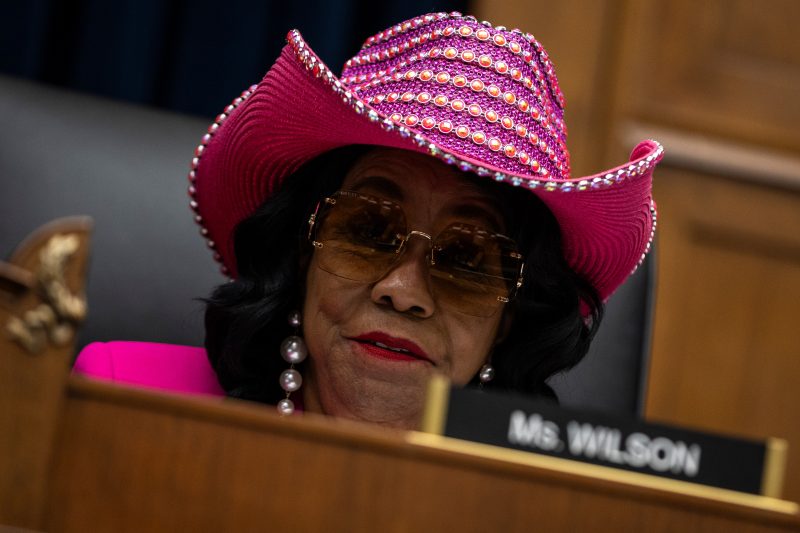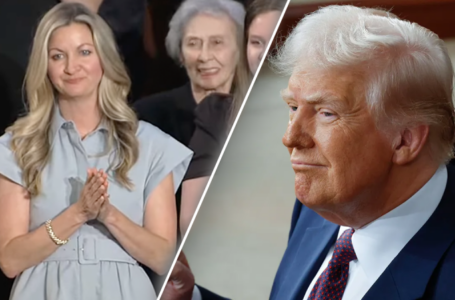‘Armor bearers:’ Black women in Congress mobilize to boost Harris


When then-Sen. Kamala D. Harris (D-Calif.) called Rep. Frederica S. Wilson (D-Fla.) in January 2019 to tell her she planned to run for president, the veteran Florida lawmaker with a penchant for festive headgear started screaming with excitement before Harris could finish her sentence.
But as soon as Wilson hung up, another call came in — this time, from Joe Biden. When Wilson didn’t pick up — “I knew what he was going to ask,” the congresswoman explained — Biden then texted her.
“I’m so sorry,” Wilson, sporting a hot pink pantsuit and bedazzled cowboy hat this week on Capitol Hill, recalled texting Biden backat the time. “I love you. You know that, but I have pledged my support to my sorority sister and friend Kamala Harris, and maybe one day, you, too.”
Five years later, Biden did just that — endorsing Harris, now his vice president, to succeed him — after dramatically announcing Sunday that he wouldn’t run for reelection in November. And so have most of the 30 Black women in Congress, who now stand as something of a national firewall for her candidacy with Harris poised to become the first Black woman to lead a major party ticket and competing to become the country’s first Black female president.
Over a dozen Black female lawmakers who spoke with The Washington Post,several of whom have heard from Harris directly since Biden’s decision to exit the race, described a fierce and personal commitment to an intense three-month sprintto organize and mobilize voters on behalf of Harris’s campaign. They are in both a celebratory and get-down-to-business mood, sporting pink and green — the colors of Alpha Kappa Alpha, Harris’s college sorority — in the Capitol halls; privately pressing holdout colleagues to endorse Harris,and preparing to hit the trail and speak out against the racist and sexist attacks they, too, have been the target of.
Rep. Lucy McBath (D-Ga.) referred to Black women in Congress as Harris’s “armor bearers.” And Rep. Barbara Lee (D-Calif.) described her congressional sorority as a “shield of protection,” explaining she considered herself a part of Harris’s “truth squad” against challenges to the vice president’s credentials and experience.
“As a Black woman, especially, I know what she’s going to have to deal with,” said Lee. “And we’re communicating that to everyone.”
Sen. Laphonza Butler (D-Calif.), the former president of Emily’s List, said this isn’t Harris’s “first rodeo” and underscored the sexist and racist treatment Black women encounter on a daily basis. But she described the role of Harris’s cohort of supporters at the other end of Pennsylvania Avenue as a regenerative force, ready to deflectthe anticipated mudslinging and propel her forward.
“Black women know that our first task is to make sure that we are the hands at her back, knowing and giving her the energy to continue to walk through every name that she is going to be called, every derogatory comment that is going to be said, every sexual and sexist innuendo that is going to be made,” Butler said. “We are the hands in her spine, helping her to continue walking because the destination of a country that offers a vision for future generations is worth every bit of the journey.”
If Harris succeeds in ascending to the presidency, Black women will be a big part of why. In 2020, exit polls showed 90 percent of Black women voted for Biden, by far the highest of any one group of voters. In this year’s race, they are expected to once again play a pivotal role in key swing states.
At the Congressional Black Caucus’s news conference formally endorsing Harris on Tuesday, lawmakers were visibly emotional as they thanked Biden for what they described as the most transformational administration in American history — and for tapping two Black women for high-profile jobs: Harris and U.S. Supreme Court Justice Ketanji Brown Jackson.
Rep. Robin Kelly’s (D-Ill.) eyes welled up with tears as her colleagues expressed their gratitude, touted the accomplishments of the Biden-Harris administration and trumpeted Harris’s qualifications.
“I’m heartbroken for him,” said Kelly, acknowledging there was not unanimity among House and Black Democrats over whether Biden should step aside. “But there’s that sense, of course, of a lot of pride that a woman of color” could be the next president of the United States, Kelly added. “But push all that aside, a qualified, brilliant woman, too. I don’t want that to be lost. There’s a lot of firsts, but she’s qualified.”
Some of the intraparty disagreement over Biden’s potential exit from the race extended beyond loyalty to Biden, and into concern for Harris’s future. Just two weeks earlier, Rep. Jahana Hayes (D-Conn.) stood up before her colleagues during an all-caucus meeting to argue that putting the vice president atop the ticket at this point in the election cycle would be setting Harris up for failure, according to two people familiar with the discussion.
Those fears, however, quickly dissipated as Harris rolled out her campaign, electrifying some voters in a way that has drawn frequent comparisons by Democratic lawmakers to former president Barack Obama’s historic 2008 campaign. During the CBC news conference, members made the case for Harris, ticking off her accomplishments in a bid to counter GOP attacks that Harris is unqualified to serve.
“She is ready, prepared, experienced, and a global leader as I said earlier — and people forget that,” said Lee, who was the first Hill lawmaker to endorse Harris for president in 2019. “There’s some that try to challenge her on all sorts of credentials. We say nuh-uh. She’s ready.”
They’re also looking for tangible ways they can help the campaign.
Rep. Joyce Beatty (D-Ohio) — who was the first person to visit Harris in her ceremonial office as vice president — said she had already spoken with Harris campaign manager Jen O’Malley Dillon. And freshman Rep. Jasmine Crockett (D-Tex.), clad in an ombre pink pantsuit on Tuesday despite being a member of a rival sorority, said that Harris surprised her with a call Sunday to thank Crockett for her work on the campaign so far.
“I was kind of thrown off that she called me on the big day — of all people,” said Crockett. “I’m not a caucus chair. I’m not capable of raising tons and tons of money. But it speaks to how much she thinks of individuals and the fact that she called a freshman — I’m sure there are plenty of people that would have never thought to call me, but she did.”
Black female lawmakers are also bracing for what they believe will be a pitched fight against racist and sexist attacks on Harris, the daughter of immigrants from Jamaica and India. Rep. Glenn Grothman (R-Wis.) said in an interview Sunday that Democrats felt they needed to support Harris “because of her ethnic background,” after conceding it would be “more difficult to beat somebody who is not Joe Biden.” Rep. Tim Burchett (R-Tenn.) referred to Harris as a “DEI hire” in an interview on Monday, using the initials for diversity, equity and inclusion programs. And an old clip of JD Vance attacking Harris for being “childless” quickly resurfaced.
House Republican leaders, including Speaker Mike Johnson (R-La.), warned lawmakers this week to avoid attacking Harris on her identity and instead focus on her policy record.
Black female lawmakers also made clear that they expected others to uplift and amplify Harris, too. After more than 40,000 people surprisingly joined a Zoom meeting hosted by the collective Win With Black Women hours after Biden endorsed Harris on Sunday, raising $1.6 million, over 20,000 Black men rallied the following night to tout Harris’s record. Soon enough, Shannon Watts, the founder of Moms Demand Action, organized a virtual meeting calling on White women to show up for Harris.
“It is not just the responsibility of the Black community to defend this woman. … We have a collective responsibility to tell allies to step up and fight for her because she’s fighting for all of us,” said Rep. Sydney Kamlager-Dove (D-Calif.).
Privately, some Democratic lawmakers — including Black Democrats — have expressed concerns about whether the country is ready for a Black woman president, invoking Hillary Clinton’s failed 2016 bid against Donald Trump. Those concerns grated on other members who have faced questions about their viability in their own races.
The doubts have persisted, despite hurdles overcome by Black women who came before them, Beatty noted, naming Shirley Chisholm, the first Black woman to be elected to the U.S. Congress; and Fannie Lou Hamer, a Student Nonviolent Coordinating Committee community organizer who co-founded the Mississippi Freedom Democratic Party.
“I hate when people say, are we ready?” said Beatty, arguing that while there was obviously more progress to be made, Black women throughout U.S. history have consistently cleared hurdles. “We have a hurdle, we jump over it — and I think this is another hurdle that we will jump over.”
After recounting her text to Biden five years ago, Wilson felt inspired to text him again this week, thanking him for his “historic” presidency, including paving the way for Harris and Black women to rise.
“I didn’t say who would be president, I didn’t say who would be VP, but one day that the two of you will be together on the same ticket,” she said, joking that she manifested Biden and Harris as a political partnership. “I hope he understands how many people in this country love him and appreciate everything he has done.”











